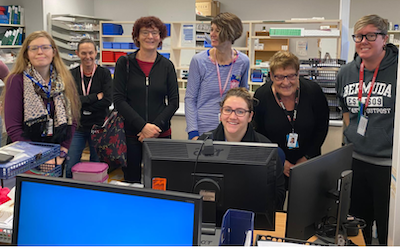
All five district health boards in New Zealand's South Island are now live with the ePharmacy electronic pharmacy management solution, replacing the end-of-life WinDose system.
ePharmacy provides full inventory management, dispensing, compounding, and repacking functionality for hospital pharmacy services, and integrates with patient management systems, financial systems and the MedChart prescribing and administration software.
ePharmacy has been live at Canterbury DHB for a number of years and a hosted instance of its system has been used by Nelson Marlborough Health and West Coast DHB.

A practice nurse in NSW has been banned from being registered for two years after admitting to using the user names and passwords of two GPs at the medical centre where they worked to forge and print prescriptions for Schedule 4 and 8 drugs.
She also accessed one family member's medical records to write prescriptions in their name and those of another family member to forge a letter purporting to be from the GP about the family member's mental health.
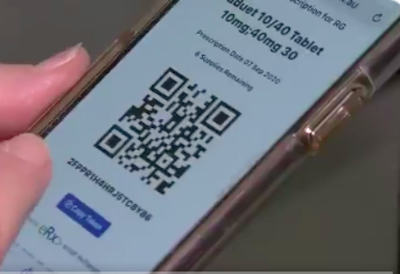
ISA Healthcare's MMEx web-based electronic medical record has been added to the Australian Digital Health Agency's (ADHA) register for electronic prescribing, the first prescribing solution that is conformant with the full version of the electronic prescribing conformance profile.
MMEx users can now send an electronic script as a token to a patient via SMS or email. ISA says it will release active script list (ASL) features later in the year when permitted.
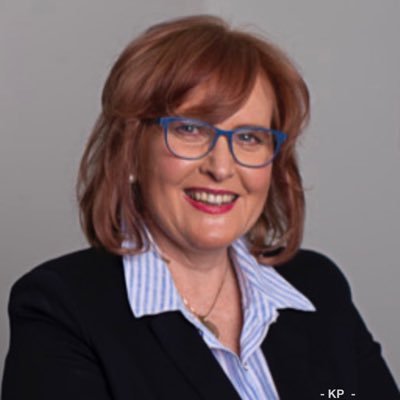
Melbourne GP and co-founder and administrator of the GPs Down Under online forum Karen Price has been elected as the next president of the Royal Australian College of General Practitioners.
Dr Price will succeed Ayman Shenouda, who has been acting president since the death of Harry Nespolon in July.

Orion Health has released an updated version of its Enterprise hospital information system, featuring the ability to integrate with the Quippe clinical documentation solution to help client hospitals with HIMSS electronic medical record adoption model (EMRAM) accreditation.
Enterprise 20.2.0 provides end-to-end management of hospitals across patient administration, clinical, departmental management, ancillary departments and back office.

The Victorian government is set to bolster its contact tracing system by rolling out a Salesforce system that can be used by regional and suburban contact tracing teams and reduce the reliance on pen and paper.
The government has also signed a $4.2 million contract with IBM to automate data analytics capability for enhanced health tracing, in addition to a $2.7m contract with Quantium Health for a COVID-19 Information and Analytics (CIA) team, which is developing and operating COVID dashboards.
While WA Health is currently using a Salesforce system for its contact tracing needs, last week it went to tender for an integrated solution that can accept direct HL7 data feeds from pathology and patient administration systems and the WA Notifiable Infectious Diseases Database.
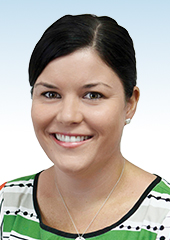
Natasha Fyles will continue as the Northern Territory's Health Minister following the August 22 election, which saw the Labor government re-elected.
Ms Fyles, who has been Health Minister since 2016, has also been appointed to work with the federal government on making Darwin's Howard Springs quarantine facility a “centre for national resilience”.
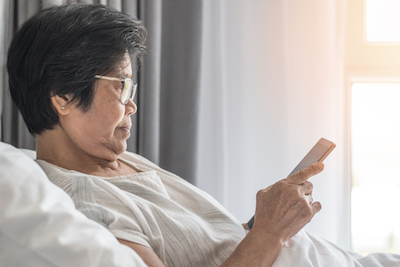
Aged care provider Anglicare Sydney is still restoring some of the systems that were put out of action last week by what it says was a malicious cyber-attack.
The attack on Anglicare follows a similar experience for Regis Healthcare last month and as CERT New Zealand issues a warning of increased Emotet activity affecting New Zealand organisations.
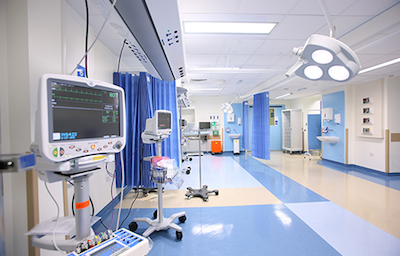
Pulse+IT's weekly round-up of international health IT news for the week ending September 6: Finland's contact tracing system, Ottawa's Epic-in-a-box, blood pressure telemonitoring, Apple and Google contact tracing app, telehealth challenges, HoloLens for clinical collaboration, digital transfer of aged care, digital clinical trials, virtual care for intellectual disability, flawed EMR lawsuit settled, transfer of care messages
How Finland got 20% of its population to download a contact tracing app in one day
Quartz ~ Tim McDonnell ~ 03/09/2020
So far, although dozens of apps have been introduced, their adoption has generally been sluggish (except in countries like China and Qatar, which made them mandatory).
Ottawa Hospital creates ‘Epic-in-a-box’ for portability
Canadian Healthcare Technology ~ Staff writer ~ 02/09/2020
The Ottawa Hospital has launched Epic-in-a-box, a briefcase-like package that allows staff and professionals to visit patients in their homes or at long-term care centres and easily access the hospital’s electronic health record system through a secure cell-phone connection.

The current CEO of Medicare and deputy secretary of the health and aged care group at the Department of Human Services Amanda Cattermole has been appointed as the new CEO of the Australian Digital Health Agency.
Ms Cattermole has been in charge of the modernisation of the Medicare, PBS and aged care payments systems at DHS, now Services Australia, for the past two years.

Telehealth was again a hot topic this week, with Andrew Baird's article on how GPs were using both phone and video our most popular. The AMA and RACGP have both been hard at it lobbying the federal government to extend the temporary MBS items for telehealth beyond September 30 and everyone seems to agree it would be a good idea.
Federal Health Minister Greg Hunt does too, repeatedly saying he's keen on telehealth and touting the benefits of the temporary measures. That he is in the unique position of actually being able to make them permanent but as yet has not done so seems to have escaped his notice.

The cardiology and radiology departments at Christchurch Hospital have swapped a fax-based system for an electronic process for ordering, triaging and signing off echocardiograms (ECGs).
Clinicians can now order an ECG electronically with requests reaching cardiology in real time and actioned according to priority. Canterbury DHB plans to phase out the use of analogue fax machines by the end of the year.
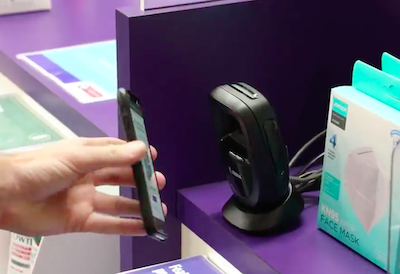
Alice Springs Pharmacy has dispensed the Northern Territory’s first electronic prescription, completing a national network of eScript capability following Australia's first successful exchange in early May.
This week’s exchange involved the Best Practice GP system for prescribing, prescription exchange service eRx Script Exchange, and dispensing system Fred Dispense with MedView Flow.
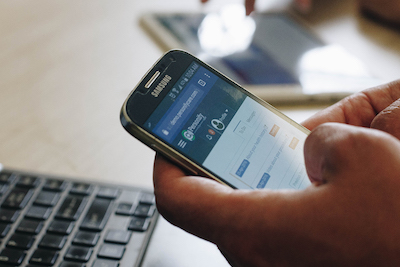
Digital health company Personify Care has joined forces with online antenatal education provider Nourish Baby Online to launch an antenatal support app that combines online antenatal education with a digital patient pathway for maternity services.
The idea is to allow maternity services to personalise and streamline pre-admission and post-discharge communications and provide on-demand access to evidence-based antenatal education.
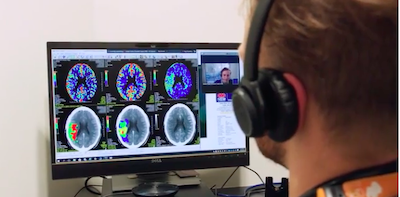
The Western Australian government has committed $9.7 million to make its Statewide Telestroke Service available 24/7, including funds to establish an integrated communication and image viewing solution for acute stroke patient diagnosis and treatment.
The solution will enable clinicians to remotely transfer CT images, data, documentation and visual diagnosis of the patient.

Victoria's Gippsland Primary Health Network is offering general practices in the region as well as the Gippsland Contact Tracing Unit the opportunity to remotely monitor patients with suspected or confirmed cases of COVID-19 in their homes.
Gippsland PHN is using the LifeguardMobile platform from US firm Lifeguard Health Networks, which includes a web portal and mobile app for health providers and a mobile app for patients that allows them to report their outcomes and vital signs.
Care coordinators at general practices and at the Gippsland Contact Tracing Unit can then monitor patients through a triage dashboard. Action can be taken if patients show signs outside of agreed clinical thresholds by contacting them via telehealth or encouraging them to visit the GP or urgent care service.
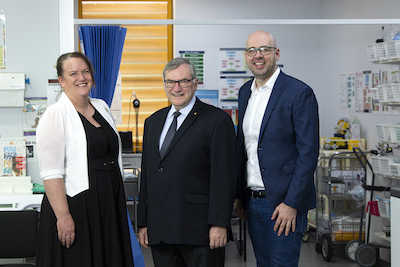
General practice insights platform Cubiko has recently completed a capital investment exercise, raising $475,000 to expand the product's application to new health providers and expanding data partners to offer more insights.
Cubiko has been developed by data analytics and dashboarding business Aginic in association with Brisbane general practice Inala Primary Care and was officially launched at the AAPM conference in Brisbane last year.
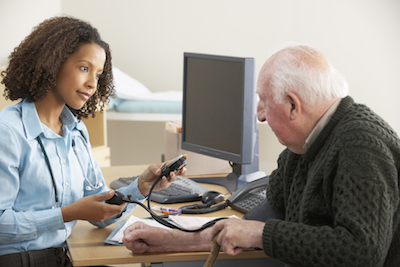
Practice management software vendor MedicalDirector will offer a deeper integration of the HealthShare referrals directory in its next release, making it available as part of the core referral workflow when the GP is creating a specialist referral.
MedicalDirector has partnered with HealthShare since 2014 to offer its FactSheets and the referrals directory as widgets in its Sidebar tool.

The WA Department of Health's Health Support Services division has gone to market for a new contact tracking and tracing solution that it hopes to implement early next year.
WA Health is currently using a Salesforce customer relationship management system for COVID-19 contact tracing but wants to implement an integrated solution that can accept direct HL7 data feeds from the state's Ultra pathology system along with the WebPAS patient administration system and the WA Notifiable Infectious Diseases Database.
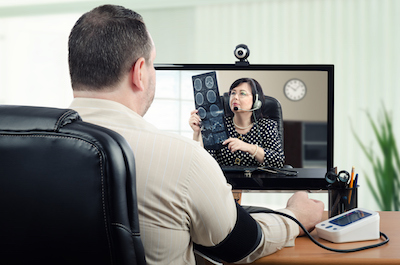
In May and June this year, only three per cent of GP telehealth consultations were conducted by video conference, despite the two Australian GP colleges and Medicare all stating a preference for the use of video rather than phone as a substitute for an in-person consultation.
Statistics derived from Medicare data for May and June 2020 show that about a third of GP consultations were by telehealth. Of this:
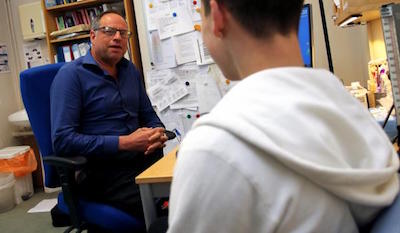
Clinical and practice management software vendor Zedmed has released version 33.2 of its solution, featuring electronic prescription capability for Victorian practices and assisted support for users in the other states.
In Victoria, ePrescribing can be enabled by the practice independently but in the rest of the country functionality needs to be enabled by the Zedmed support team on behalf of the practice to ensure there are pharmacies nearby that are able to dispense eScripts.
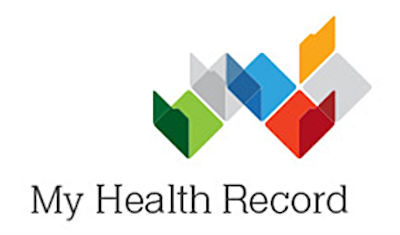
The new chief executive of the Australian Digital Health Agency (ADHA) is expected to be announced this week, nine months after its inaugural CEO stood down.
It is understood that the successful applicant is a senior public servant, with the original shortlist of five whittled down to a choice between Medicare CEO Amanda Cattermole and former deputy secretary of the Department of Health, Caroline Edwards.

SA Health has issued a call for expressions of interest from prescribers and pharmacists to take part in an early testing program of its ScriptCheckSA real-time prescription monitoring system.
SA Health awarded a contract in July to Fred IT to build the system based on Victoria's SafeScript system, which was developed and built by Fred. Queensland also plans to use SafeScript as the foundation for its QScript version.

Pulse+IT's weekly round-up of international health IT news for the week ending August 30: FHIR interoperability mandate, medical interoperability gateway, Amazon's wearable health tracker, Fitbit advanced health smartwatch, PHI in medical images, video monitors for COVID, patient-initiated follow-ups, VA's $16b EHR begins, telehealth billing rorts
Payers are working to meet deadline for interoperability mandate
Healthcare Finance ~ Susan Morse ~ 21/08/2020
The majority of health plans say they do not feel ready to meet the new FHIR interoperability standards mandated by CMS.
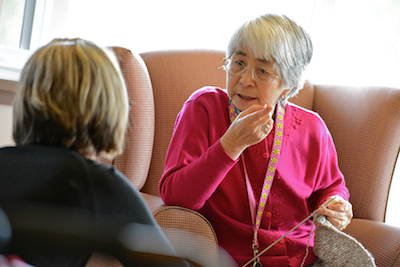
All eyes were on the Victorian aged care sector this week as it continued to bear the brunt of the second coronavirus wave. Many were also watching the poor performance of Australia's Aged Care Minister Richard Colbeck, who has had his responsibility for decisions about COVID-19 related aged care emergency measures removed and handed over to Health Minister Greg Hunt.
Thankfully the outbreak in aged care appears to have stabilised and the number of facilities on the critical list is beginning to fall. This may have been assisted by moves a month ago by the federal and state governments to set up a Victorian Aged Care Response Centre (VACRC) to manage the outbreak and mobilise extra carers for the 129 facilities that have reported infections so far. The centre's executive director Joe Buffone said the centre was tracking 13 facilities in the red “critical” category in early August and that number has now stabilised to four.
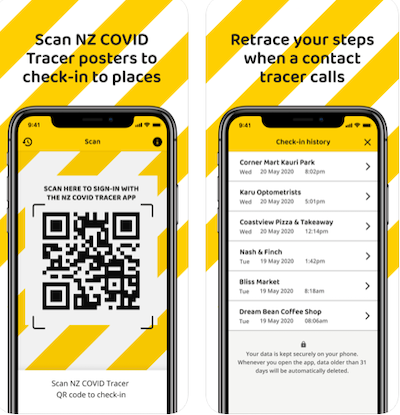
New Zealand will make further upgrades to its NZ COVID tracer app early next month and next week will make it mandatory to display app-linked QR codes on posters on most forms of public transport.
In a response to recommendations made by Ayesha Verrall in her rapid audit of contact tracing in April and a progress report by the Contact Tracing Assurance Committee (CTAC), Health Minister Chris Hipkins said New Zealand was in an increasingly strong position with an improved contact tracing regime.

A research project to develop a framework to evaluate virtual care models such as remote health monitoring is one of three rapid response research grants awarded by La Trobe University in association with Optus and Medibank.
The projects, including one that will evaluate tele-rehabilitation for cancer survivors, are all due to be completed by February 2021.

A new web-based incident management system that is able to track and monitor COVID-19 cases and transfers in aged care facilities along with PPE supplies has gone live to help support the response to outbreaks in Victoria.
The Victorian Aged Care Response Centre (VACRC) went live with the new system last week and while it is being used for the response in Victoria at the moment, it has been designed and is available to be used nationally if required.
Christchurch aged care technology developer Spritely has received funding to run a trial of its technology to screen for COVID-19 in retirement villages.
Spritely's tablet-based technology, which can monitor for falls, keep residents connected with free video calling, supports medication adherence and tracks vital signs such as blood pressure, heart rate and weight wirelessly, has been used at Alpine View Lifestyle Village and Burlington Village in Christchurch for the past year.
Now, the company has received a grant from Callaghan Innovation and the Ministry of Business, Innovation and Employment (MBIE) to further develop the system to detect, triage and contain potential COVID-19 outbreaks in the sector.

Melbourne's Northern Health has chosen HealthLink's SmartForms technology as its standard platform for accepting electronic referrals into its specialist clinics from GPs.
Northern Health has been trialling SmartForms since 2018, initially as part of the Victorian eReferrals program.
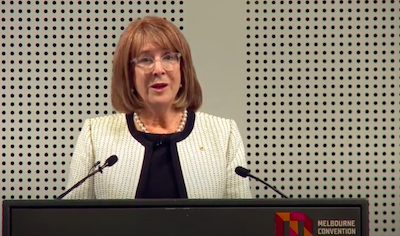
Former chair of the National Health and Hospitals Reform Commission Christine Bennett has been appointed to the board of Telstra Health, succeeding Michael Kidd, who has taken on the role as Australia's deputy chief medical officer.
Professor Bennett is currently deputy vice chancellor at the University of Notre Dame Australia in Sydney and was previously dean of its School of Medicine. She was also formerly chief medical officer for MBF and BUPA Australia.

Researchers at the University of Melbourne have partnered with Amazon Web Services and Twilio to run a project using a private WhatsApp channel to capture healthcare workers' experiences of the coronavirus pandemic and improve future preparedness.
The researchers, from the Nossal Institute for Global Health and the School of Computing and Information Systems at the University of Melbourne, have set up a WhatsApp channel that enables the compilation of voice memos from healthcare workers on the frontlines.
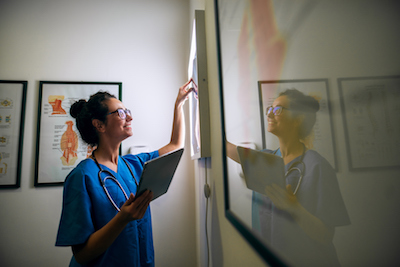
Medical imaging solutions vendor EPIC-X has signed an agreement with Hyland Healthcare to resell and implement Hyland's PACSgear suite of image acquisition and connectivity tools in Australia.
The PACSgear suite allows healthcare providers to integrate images, film, media and documents from a variety of specialties throughout a healthcare facility with a central picture archiving and communications system (PACS), vendor neutral archive (VNA) or EMR.

SA Pathology has rejected claims that it has “dumped” the services of Adelaide digital health firm Personify Care due to a data breach.
Channel 7 News reported last week that patient details had been sent to the wrong people, with one man who hadn't had a COVID swab reporting he received a message addressed to someone else.

Global Health has signed an agreement with GoLogic Group to provide a single solution for healthcare document exchange using the ReferralNet secure messaging service and GoLogic's GoFax online digital fax service.
ReferralNet users will be able to send and receive clinical documents from their colleagues who use GoFax from within existing clinical software configured with ReferralNet.

Pulse+IT's weekly round-up of international health IT news for the week ending August 23: Global disease tracker returns, CDC bypass decision reversed, predicting COVID-19 with Fitbits, Jordanian telehealth for Beirut residents, ICD-10 codes weak on COVID, NHS IT purchasing framework, telehealth through the TV, remote pregnancy monitoring
Ottawa revives its global disease monitoring agency
Canadian Healthcare Technology ~ Staff writer ~ 19/08/2020
The agency is again issuing alerts about serious disease outbreaks for the first time since May 2019, when it was effectively shut down.
Covid-19 data will once again be collected by CDC, in policy reversal
Wall St Journal ~ Robbie Whelan ~ 20/08/2020
Hospitals will return to reporting new cases to Centers for Disease Control and Prevention, Trump administration says, after shift to Health and Human Services led to delays and data problems.
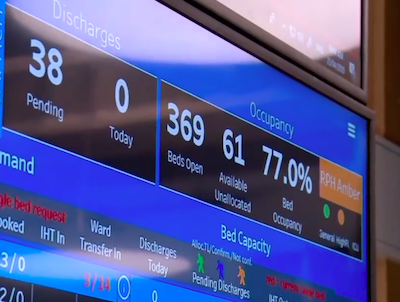
The long-running saga of HealthEngine and several instances of its naughty behaviour finally came to an end this week with a spanking $2.9 million fine handed down courtesy of the Federal Court of Australia. In action instigated by the ACCC last year following an ABC investigation, HealthEngine acknowledged it shared users' personal information with insurance brokers without adequately disclosing this to the users, and picked up a tidy $1.8m over four years for doing so.
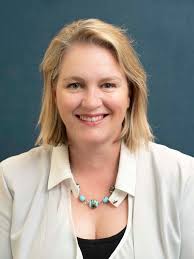
Canterbury District Health Board chief digital officer Stella Ward and its director of nursing Mary Gordon have joined five other top executives, including CEO David Meates, in resigning from the health service.
Chief medical officer COVID-19 response leader Sue Nightingale resigned late last week, along with HR boss Michael Frampton, funding and decision support executive director Carolyn Gullery and finance head Justine White.

SA Health has worked with vendor InterSystems to prepare the state's health system for a potential second wave of COIVD-19 through a new interface between its Notifiable Infectious Disease Surveillance (NIDS) system and a Salesforce-based workflow system.
The integration between the workflow system and NIDS is provided by SA Health’s Health Information Broker (HIB), a statewide health information exchange based on InterSystems technology.
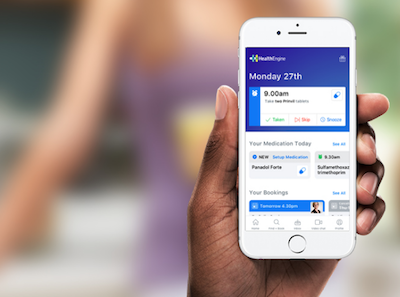
The Federal Court has ordered online appointment booking service HealthEngine to pay $2.9 million in penalties for publishing misleading patient reviews of medical practices and sharing patient contact information with private health insurance brokers.
HealthEngine was taken to court last year by the Australian Competition and Consumer Commission (ACCC) in relation to its behaviour, revealed in separate investigations by the Sydney Morning Herald and the ABC.

WA Health is on the lookout for a new CIO for its Health Support Services (HSS) shared services arm following the resignation of Holger Kaufmann after two years.
Mr Kaufmann took up the role in June 2018 following a stint as executive director of the GovNext-ICT infrastructure reform program. HSS provides a suite of technology, supply, workforce and financial services to WA Health.

Clinical coding and grouping software vendor Eurofield Information Solutions has appointed Anders Ekstrom as its new CEO, taking over from company founder and managing director Alfred Papallo, who is now chairman.
Mr Ekstrom previously spent two years with medical device firm Hologic and 10 managing life sciences firm Eppendorf in the region, as well as six with Medtronic.

The Hunter New England and Central Coast Primary Health Network (HNECC) has implemented a cloud-based, near real-time tool called Capacity Tracker that is monitoring the status of PPE supplies, bed capacity, staffing and general practice support for residential aged care facilities in the region during the COVID-19 pandemic.
First developed by the North of England Commissioning Support Unit (NECS) and used to manage the flow of patients between NHS hospitals and care homes in the UK, HNECC has adopted and adapted the system to provide a visual representation of capacity constraints in aged care facilities and general practices.

Researchers at the Black Dog Institute and Sydney University are testing modified versions of their HeadGear app to create targeted experiences for junior doctors and female workers.
The app has been designed with a male audience in mind working in high-risk industries and has shown reduced rates of new onset depression by up to 50 per cent in a trial of 2200 people.

Macquarie University Hospital (MUH) has implemented a National Safety and Quality Health Service (NSQHS) compliant online informed financial consent (IFC) process with the go-live of its new patient portal.
MUH is the 75th hospital in Australia to roll out EpiSoft's epi-me patient portal, which allows patients to complete their pre-admission information online.
The new functionality at MUH means patients will receive a notification to view and acknowledge their hospital estimates online. Hospitals using epi-me also have the option to use the portal’s native payment gateway so patients can pay any out of pocket expenses online.
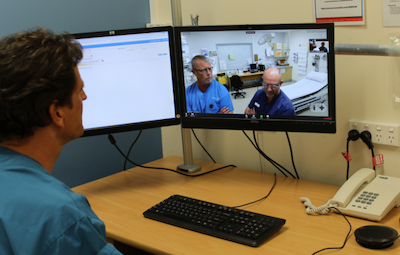
Waitematā, Auckland and Counties Manukau district health boards have moved to virtual care where possible due to the new cluster of COVID-19 positive cases in the community.
The move, which has been extended to September 7, includes some scheduled community appointments, outpatient clinics and elective surgeries.

Philips Healthcare has won a contract worth more than $6.5 million over five years to provide an integrated care management solution for WA's East Metropolitan Health Service's new Command Centre.
Based at Royal Perth Hospital and also covering Armadale Hospital, the service will eventually monitor 100 beds from the new centre, which opened in April.
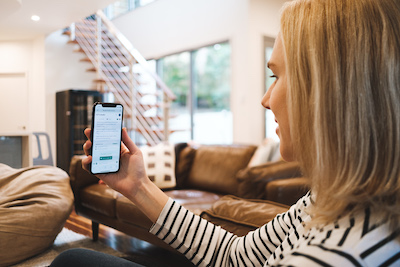
Brisbane-based telehealth firm Emerging Healthcare is offering its new GPConsults telehealth platform to GPs and medical specialists to use for free for another six months thanks to a $300,000 subsidy from health insurer nib.
First launched in March, Emerging Healthcare is now also planning to roll out a version for allied health practitioners next month.

General practices in the greater Melbourne area are being encouraged to use new electronic prescribing functionality to support people most at risk from COVID-19 and to communicate with local pharmacies to ensure everyone is ready to write and dispense an eScript.
The new technology has been in testing since May, but last week the Australian Digital Health Agency asked that practices located outside the trial regions not rush to use the technology until there was a wider roll-out in the pharmacy sector.

Pulse+IT's weekly round-up of international health IT news for the week ending August 16: Germany's digital health plans, Meow bot to the rescue, NHS England contact tracing app, remote-controlled ventilators for COVID, home health tech for rural patients, VR for 3D models, streaming video to ambos, Canada's digital tech supercluster, telehealth thumbs up for senior Americans, Epic employees get bolshie, switching from phone to video consults
What will it take for Germany to embrace digital health?
The BMJ ~ Helen Albert ~ 11/08/2020
Germany has long resisted digitisation, but could a new law and the covid-19 pandemic ease that attitude?
Unsecured database exposed on web - then deleted
Information Security Media Group ~ Marianne Kolbasuk McGee ~ 12/08/2020
Researcher says data on 3.1 million patients exposed. Did 'meow bot' fix the problem?

We had our fingers crossed this week that things would go well at the Parkville precinct in Melbourne, where three hospitals went live with a new electronic medical record on Saturday morning, and it appears that things have gone smoothly. We have not heard a peep or a grumble about the implementation so far, apart from questioning the wisdom of going live during a global pandemic in a city experiencing a second wave of infections in the first place.
The Royal Children's Hospital implementation, which has been adopted by its neighbours, seems to have been the right one and if there were major problems this week, everyone would have heard. Parkville's big bang during COVID-19 will make a fascinating case study one day.

Melbourne's Austin Health has set up a telehealth ‘hub’ that can house up to 21 clinicians at a time to help remotely manage between 70 and 80 per cent of its outpatients appointments.
Austin Health uses Healthdirect Australia's Video Call system, which is underpinned by the locally developed Coviu telehealth platform, for video consults and is also offering phone consults.
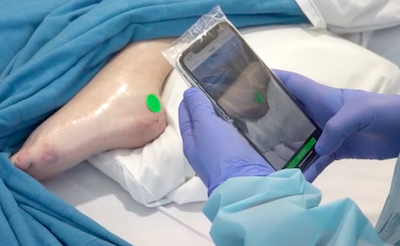
Sydney Local Health District is trialling an app that uses artificial intelligence to help analyse, treat and monitor chronic wounds, with the hope it can be rolled out to the rest of NSW.
The Tissue Analytics app being trialled at Royal Prince Alfred Hospital and Sydney District Nursing is integrated with the hospital's Cerner electronic medical record so images and data can be stored, reviewed and compared.


NSW aged care provider Pathways Residences has become the first to roll out the proximity detecting technology Contact Harald for both visitor check-in and COVID-19 contact tracing, with central Victorian provider Havilah also set to implement the Australian developed technology in the next week.
Contact Harald is a wearable, stand-alone card-to-card based contact tracing system that uses low energy Bluetooth technology. It has been designed as a workplace-based solution to assist contact tracers reduce the time between potential exposure, being tested and self-isolating.
It has been developed by financial technology firm Safedome but has been put through the RMIT Cisco Health Transformation Lab in Melbourne to adapt it for healthcare purposes.

Specialist medical practices using the practice management and clinical information system Shexie Platinum can now send manual and automated SMSs to patients in their preferred language.
The practice can set up templates of SMS wordings in multiple languages in that language’s script for appointment confirmations, reminders, recalls, general messages and more.

Private health insurer Medibank is extending coverage for psychology, physiotherapy, dietetics, occupational therapy, podiatry, exercise physiology and speech therapy delivered by telehealth until further notice.
Medibank's figures show people aged 30 to 39 have been the fastest adopters of telehealth, accounting for a quarter of all claims. Psychology and physiotherapy were the most popular services used over telehealth in this age group.

The West Australian government has allocated $8.1 million from its coronavirus recovery scheme to begin planning for its statewide electronic medical record.
WA Health issued a request for information from EMR vendors on the feasibility and potential options for implementing a contemporary EMR across the state in August last year.
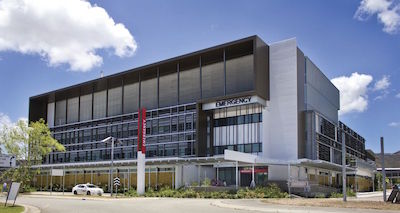
Townsville Hospital and Health Service (THHS) has signed a contract with ASX-listed digital health system vendor Alcidion to roll out its Smartpage clinical communication system.
This will be Alcidion’s first contract with a Queensland hospital and health service to implement Smartpage. Existing users such as ACT Health, Counties Manukau DHB and Nelson Marlborough DHB have also begun extending the use of the solution in their health services.

General practices located outside the electronic prescribing communities of interest regions are being asked to wait until pharmacies in their region are able to accept eScripts before issuing them.
The Australian Digital Health Agency (ADHA) has asked GP software vendors to suspend access to ePrescribing functionality in their systems while a plan is worked out to scale the new capability nationally, saying there have been several cases where a consumer has been unable to have their medicine dispensed at their pharmacy of choice.
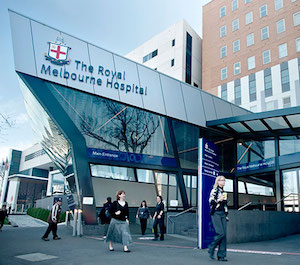
Royal Melbourne Hospital, Royal Women's Hospital and the Peter MacCallum Cancer Centre have all gone live with the Parkville precinct's new electronic medical record.
The $124 million system went live on Saturday, with the three health services joining Royal Children’s Hospital in a big bang implementation.

Pulse+IT's weekly round-up of international health IT news for the week ending August 9: Telehealth and older patients, $18.5b Livongo and Teledoc merger, $16.4b Siemens Healthineers and Varian buy, telemedicine and COVID cancer backlog, Apple-Google COVID tracing in the UK and US, FDA approval for Samsung Health Monitor app, US Medicare telehealth extension, patient identifier ban, EMRs and physician burnout
JAMA study warns telemedicine not suitable for 38% of patients over 65
MobiHealthNews ~ Laura Lovett ~ 05/08/2020
The study, which looked at data from adults over the age of 65, found that over a third of people weren’t ready for video visits. Researchers sited issues ranging from difficulty in hearing to tech issues.
Livongo, Teladoc strike $18.5B merger, creating a digital health behemoth
MedCity News ~ Elise Reuter ~ 05/08/2020
The deal would combine one of the largest telehealth companies with a platform for managing an array of chronic conditions, including diabetes and heart disease.
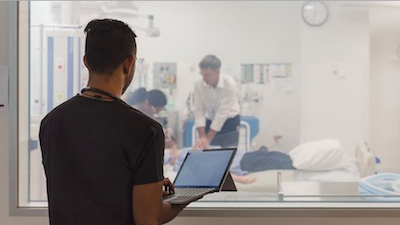
Along with “novel coronavirus”, “social distancing” and “hydroxychloroquine”, “contact tracing apps” will go down as one of the most notable additions to the pandemic lexicon. They have certainly proved controversial as privacy concerns run headlong into public health necessities, and few if any have proved overly useful.
New Zealand's COVID Tracer app hasn't been hugely successful so far with fewer than 600,000 downloads, but thankfully it hasn't really needed to be. However, with one eye on the second wave plaguing Victoria, the NZ government has announced it is going to trial a new wearable Bluetooth alternative called CovidCard that has been strongly promoted by business groups and some academics.

Clinical information system vendor InterSystems has released the latest version of its TrakCare electronic medical record, dubbed T2020.
The new version has been released on schedule during the COVID-19 pandemic, allowing InterSystems to integrate COVID functionality into the new version. InterSystems has also made several COVID-19 enhancements available for free to users of earlier versions.

The Australian Digital Health Agency's national health CIO Ronan O'Connor has resigned to take up a position with global health IT not-for-profit the Healthcare Information and Management Systems Society (HIMSS).
Mr O'Connor headed up the delivery of the My Health Record expansion program when it flipped to opt-out in 2018, and has also been overseeing a program to re-platform the system when the contract with national infrastructure operator Accenture ends in 2021.

New Zealand will go ahead with a community-wide trial of the Bluetooth-enabled CovidCard technology in Rotorua as an adjunct to its NZ COVID Tracer app.
The NZ government funded a trial of CovidCard run by the University of Otago in conjunction with the Nelson Marlborough DHB during the lockdown period and found it had benefits, Digital Services Minister Kris Faafoi said.

A virtual triage service launched during COVID-19 lockdown by skin cancer diagnostics service MoleMap has identified skin cancer in 12 per cent of high-risk patients examined.
The new contactless service was used by melanographers in New Zealand and Australia to assess patient lesions remotely and refer high priority cases for further diagnosis and treatment during lockdown.

Online appointment booking service HealthEngine has released a report looking at data from nearly 220,000 telehealth appointments between April and June 2020, which shows the majority of patients booking a telehealth appointment were doing so with their regular GP or practice.
An accompanying survey of more than 400 patients found that 95 per cent of telehealth consults were conducted by telephone, but that 15 per cent of patients surveyed said they would prefer a consult by video.

Canterbury District Health Board CEO David Meates has resigned after 10 years in a surprise announcement, which follows the departure of executive director of planning Carolyn Gullery.
Mr Meates led the DHB through some of its most challenging events, including the Christchurch and Kaikoura earthquakes and the terrorist attacks in March 2019.
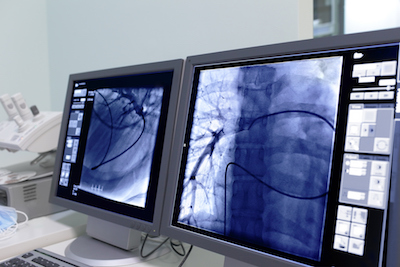
The East Arnhem region in the Northern Territory has received close to a million dollars in funding over two years in a program aimed at embedding digital health capabilities to improve healthcare provision in regional and remote communities.
The program is focusing on ensuring healthcare providers are using the My Health Record system, along with secure messaging, telehealth and medicines safety.

Patient experience platform vendor Oneview Healthcare has partnered with US telehealth technology provider Caregility to deliver its telehealth applications on Oneview’s platform in Australia.
The integration will initially focus on Caregility’s iConsult mobile app, which features an auto-answer capability that enables virtual rounding without requiring the patient to answer a call or a staff member to enter the room to launch the call.

ASX-listed aged care provider Regis Healthcare has been the target of a cyber attack, understood to involve ransomware, with some personal data copied and released publicly.
The company, which runs 65 residential aged care facilities as well as eight retirement villages and some home care services, reported today that it had implemented its back-up and business continuity systems and the incident did not affect delivery of resident care or services.

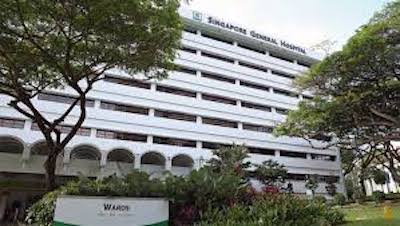
Pulse+IT's weekly round-up of international health IT news for the week ending August 2: SARS lessons for South-East Asian hospitals, 10 big ideas in health IT, virtual first call for NHS GPs, remote HIV care, single child health system for Liverpool, health sector data breaches cost more, secure email for Alberta's MHR, Withings focus on remote monitoring, Garmin hacked
Lessons from SARS
Healthcare IT News ~ Philipp Grätzel von Grätz ~ 27/07/2020
During the COVID-19 pandemic, hospitals in South-East Asia had an advantage over medical institutions in other parts of the world, since they had dealt with a SARS virus in 2003 already.

Pulse+IT's top story for this week was the announcement that the ACT had chosen Epic's EMR for the territory's ambitious digital health program. This came as little surprise as the health service had used the term “big bang implementation” at a vendor briefing not long after the release of the tender last year.
The most successful big bang in Australian healthcare – the only one, come to think of it – has been at the Royal Children's Hospital, which went live with Epic in 2016. RCH's neighbours in the Parkville precinct will be girding their loins next weekend for their big bang, with Epic set to go live at Royal Melbourne, Royal Women's and Peter Mac on Saturday, August 8.

The Ministry of Health has extended its sponsored data partnership with mobile network operators Spark, Vodafone and 2degrees to give New Zealanders access to health websites and services free from mobile data charges until next June.
This includes access to the ministry's own site, the official COVID-19 site, Health Navigator and to the two main GP patient portals, ManageMyHealth and Health365. ManageMyHealth is offered by practices using Medtech and Medtech Evolution, while Health365 is offered by myPractice users.
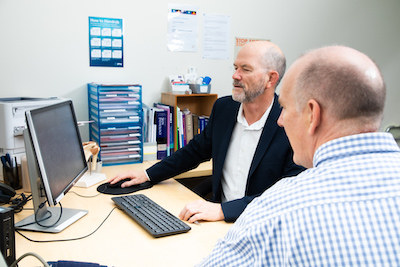
Steve Hambleton has been appointed independent clinical adviser to the Australian Digital Health Agency for a six-month period, taking up a role recently vacated by former chief medical adviser Meredith Makeham.
A former AMA president, Dr Hambleton was a member of the Royle review into the PCEHR, now known as the My Health Record, and chairman of NeHTA as it transitioned to the new agency in 2016.

Patients who have tested positive for COVID-19 at Alfred Health and Monash Health and are self-isolating at home are being monitoring remotely using an intelligent decision-support system called CovidCare, developed in association with Deakin University.
The University of Melbourne is also running a clinical trial of a remote monitoring solution – also called CovidCare – which is now actively recruiting respiratory clinics and general practices. Patients in self-isolation or quarantine are provided with an app to self-monitor their physical symptoms and to identify mental health needs.
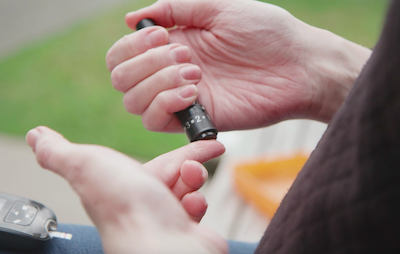
Brisbane's Mater Mothers' Hospital and Redland Hospital are trialling an app platform that can remotely monitor pregnant women with gestational diabetes and provide near real-time data to care teams.
First developed by CSIRO’s Australian e-Health Research Centre (AEHRC) and Metro South Hospital and Health Service, the MoTHer platform has been designed to replace manual paper-based record keeping, which usually reaches members of a patient's clinical team every week or two by a combination of email, phone and fax.
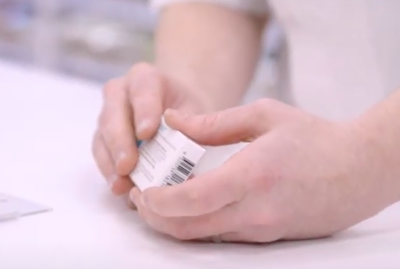
Clinicians in Western Australia have written and dispensed the state's first electronic prescription, with Plaza Medical Centre and Wizard Pharmacy in Kalgoorlie successfully completing the exchange.
The process involved Best Practice Software, prescription exchange service eRx Script Exchange, Fred NXT Dispense and Fred's MedView Flow.

Pharmacy software vendor Fred IT Group has launched a cyber security package for pharmacies that includes intrusion prevention and detection for on-site devices along with real-time 24/7 network monitoring.
Fred says the package complements existing antivirus products and back-ups, and can be used by all pharmacies regardless of dispense or point of sale software.

Queensland has joined the rest of the jurisdictions in approving electronic prescription capabilities, with the first eScript dispensed at Grace Family Practice in Bargara, near Bundaberg, this week.
GP Preshy Varghese wrote the script and send the token to the phone of Best Practice Software commercial analyst William Durnford, who had it dispensed by pharmacist Campbell Gradon of Alliance Pharmacy in Bargara Central Shopping Centre.

Vitro Software has teamed up with fellow Irish firm myPatientSpace to offer Australian and New Zealand users of its digital medical record a new remote patient management (RPM) and telemedicine module.
The remote management module is intended to reduce non-critical hospital visits and make social distancing compliance easier, particularly in hospitals with reduced capacity due to COVID-19 restrictions.

St Vincent's Public Hospital and St Vincent's Private Hospital in Melbourne have gone live with EIS Health Data Solutions' TurboGrouper clinical coding and grouping software solution, which has been integrated with the hospitals' webPAS patient administration system.
TurboGrouper is used to group coded medical records into Australian Refined - Diagnosis Related Groups (AR-DRG) for reporting to the Independent Hospital Pricing Authority (IHPA) each month for activity-based funding purposes. AR-DRGs categorise patients into clinically meaningful groups with similar resource consumption and costs.
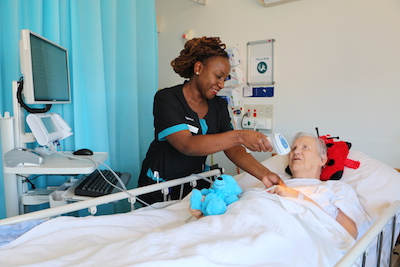
ACT Health will implement the Epic electronic medical record for its $151 million Territory-wide digital health record project, which will assist it in its aim to achieve HIMSS Level 6 in three years' time.
Epic will be rolled out in a big bang implementation at Canberra Hospital, Calvary Public Hospital Bruce and University of Canberra Hospital, along with community health centres, walk-in centres and Justice Health centres.

The Australasian Institute of Digital Health (AIDH) is hosting a webinar on digital health standards and standards selection as part of an attempt to re-set the strained relations between the Australian digital health standards community and regulators.
The webinar comes as the Australian Digital Health Agency plans to release a series of historical documents and reports that outline its thinking on healthcare standards and interoperability over the years.
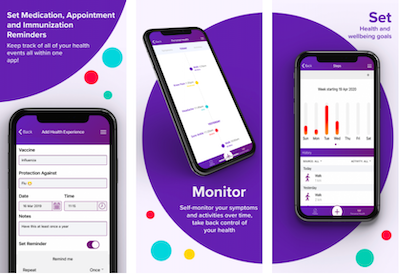
Personal health app Wanngi has added a Health Forecast feature to its platform, delivering a daily breakdown of health essentials to users such as medication reminders, appointments and weather information that may have an effect on health such as local UV levels and air quality.
Wanngi is a health management app that enables users to collect and store their data in one secure place and aims to help users to accurately manage their day using information provided by the application.

Sydney GP and RACGP president Harry Nespolon has died from pancreatic cancer at the age of 57.
Dr Nespolon, who was coming to the end of his two-year stint as college president, was at the forefront of advocating for the importance of primary care during the COVID-19 pandemic and strongly supported the extension of telehealth.

Cloud-based clinical and practice management software vendor MediRecords and patient education specialist Healthily are teaming up to help support patients to manage chronic conditions in virtual healthcare settings.
The two companies plan to integrate Healthily's GoShare platform with MediRecords to streamline the provision of health information following a virtual consultation. The integration is expected to be available from September.

Pulse+IT's weekly round-up of international health IT news for the week ending July 26: Android contact tracing app collects location data, Microsoft's IoT connector for FHIR, COVID tests automated for GPs, removing restrictions on telehealth, Ireland's open source tracing app, data transfer problems in Germany, Emotet botnet reemerges carrying Qbot, Canada's AI path, revolt against CDC data bypass
Google promises privacy with virus app but can still collect location data
New York Times ~ Natasha Singer ~ 20/07/2020
But for the apps to work on smartphones with Google’s Android operating system — the most popular in the world — users must first turn on the device location setting, which enables GPS and may allow Google to determine their locations.
Microsoft unveils Azure IoT Connector for FHIR, to help with RPM security
Healthcare IT News ~ Mike Miliard ~ 17/07/2020
The cloud service can enable developers to more easily create secure pipelines to handle streaming biometric data and other PHI from remote patient monitoring devices.
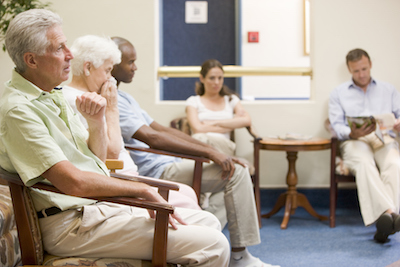
Debate over telehealth continued this week as the new restrictions ordered by the Department of Health came into force in a hurry. Some online appointment booking services are now asking patients trying to book a telehealth conference if they have seen a GP at that practice in the previous 12 months, with one reader telling us she had tried to book a telehealth conference to get a new referral but was knocked back because she hadn't presented there in person in over a year.
We had a lot of debate on the topic on our blog from last week, with numerous examples given of different cohorts of patients, especially vulnerable groups, who will now be prevented from accessing MBS-funded telehealth services just when they were finally given access to them. In an article in this week's MJA Insight, Elwood Family Practice GP Andrew Baird detailed a number of cases where vulnerable patients will be disadvantaged by the new rules and provides a great deal of food for thought.
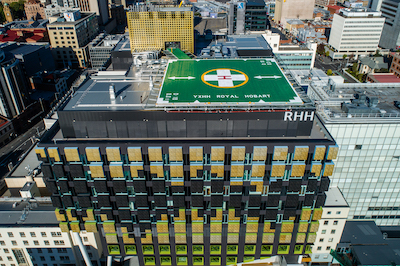
Royal Hobart Hospital (RHH) has gone live with the Medtasker clinical communication and task management platform, bringing forward its planned May start by one month in advance of a potential influx of patients with COVID-19.
Fortunately that potential did not eventuate, but the hospital has now completed the largest implementation yet for Medtasker, with the emergency department (ED), surgical and medical inpatient wards, new K-Block theatres, and 24/7 including Hospital at Night all now using the technology.
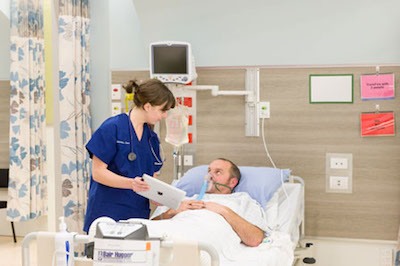
Canterbury District Health Board will soon go live with the Cortex mobile clinical documentation application at the emergency department at Christchurch Hospital's new Hagley acute services building, joining another 27 clinical departments using the locally designed platform.
Cortex comprises a digital patient list and task manager, a clinical documentation system, electronic ordering and viewing of results, and a care coordination and communications channel that links all team members in a patient's care, delivered on iPhones and iPads at the bedside.

The latest figures from the Medicare Benefits Schedule show the number of MBS-funded telehealth consultations continued to rise as the COVID-19 pandemic held sway in May, with almost one-third of all consults delivered by telehealth.
The figures show that the total number of MBS consultations reported in May 2020 was 16.6 million, of which 5.4 million or 32.7 per cent were conducted by telehealth.
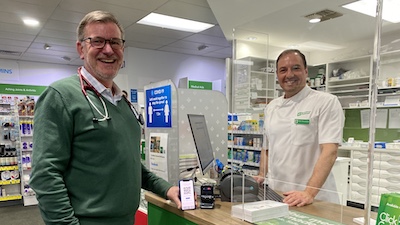
The first electronic prescription in South Australia has been exchanged between Chandlers Hill Surgery in Happy Valley and TerryWhite Chemmart in Old Reynella, with GP Danny Byrne describing the ease of the process as a piece of cake.
Dr Byrne used his practice's Best Practice system to write the script and text the token to his own phone, with the medication dispensed by Chris Tsamandanis using his pharmacy's Minfos system.

Digital medical record solution vendor InfoMedix has signed the first hospital client to roll out its new cloud-enabled DMR and has completed the acquisition of secure clinical communications app Clinivid, which has now been integrated into the InfoMedix product suite.
Best known for two decades as Australia's leading scanned medical record supplier, InfoMedix is now under new ownership and management and is actively transitioning itself into a digital platform that can integrate with any number of other digital systems as well as electronic medical records.

Update: ABC News is now reporting that a teenager was responsible for publishing the information on a public website, not a hacker as first thought.
A paging service run by Vodafone has been linked to a data breach in Western Australia, with messages including private health information published on a now-closed website.
Channel 9 News first reported the data breach yesterday, saying it had discovered a public website on which hackers had published numerous messages containing sensitive information including doctor and patient names, addresses, phone numbers and health concerns.

DXC Technology has sold its healthcare IT business to European healthcare and diagnostic software company Dedalus Group for $US525 million in cash.
DXC's software is used in the majority of Australian and New Zealand public hospitals through its patient administration, electronic medication management, clinical documentation and pharmacy systems. The healthcare business was previously part of CSC, and before that iSOFT and IBA Health.

Aged care software vendors are being recruited to work on a national two-year project that aims to establish a minimum data set for the sector and build tools to enable data to be exchanged between software solutions and across care settings.
The project will use HL7's Fast Healthcare Interoperability Resources (FHIR) standard to enable the exchange of information between healthcare systems and solutions, following a similar project that is building FHIR implementation guides for data exchange between GP systems.
The project, named Aged Care Data Compare, will also allow aged care providers to benchmark themselves against industry standards and aims to create a library of quality indicators.

ASX-listed healthcare software vendor Global Health has extended its partnership with Diabetes Victoria to promote the use of its Lifecard personal health record.
Global Health is currently working to integrate Lifecard with wearables and remote monitoring devices and to enable Lifecard subscribers to view data stored in their My Health Record from the app.
Copyright © 2025 Pulse IT Communications Pty Ltd. No content published on this website can be reproduced by any person for any reason without the prior written permission of the publisher. If your organisation is featured in a Pulse+IT article you can purchase the permission to reproduce the article here.
Website Design by Get Leads AU.